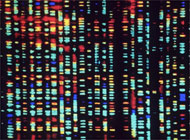DNA database helps crack crime

Genetic fingerprinting has helped Swiss police solve more than 1000 criminal cases following the introduction of a federal database two years ago.
According to figures released on Monday by the Federal Police Office, 21,389 samples of desoxyribonucleic acid – or DNA – have been stored in the database since July 1 2000.
DNA is the carrier of genetic information in living organisms, and analysis of the material allows for the identification of individuals with a high degree of certainty.
The vast majority of samples were extracted from mucus swabs, with the rest obtained from crime scenes.
“Police officers typically collect DNA samples at the scene of a crime and they can then compare them with the DNA stored in the databank,” Hanspeter Thür, the Swiss data protection commissioner, told swissinfo.
“Every person who stands accused of committing a serious crime, such as murder or rape, is obliged by law to give a DNA sample,” he added. “It’s a very useful tool for solving such crimes.”
More and more cases solved
Of the cases solved thanks to DNA profiling, 441 were related to offences against property, a broad category which includes theft, armed robbery and damage to property, the federal office said.
In addition, nine cases of unlawful killing and several sexual assaults were solved by means of DNA.
Since the database was launched, the number of cases solved by means of DNA testing has increased steadily, the office said, from ten cases in the second half of 2000 to 551 in 2001.
In the first five months of this year, 484 cases were successfully closed as a result of DNA profiling.
Samples destroyed
DNA sampling is not permitted in the case of minor offences, including illegal entry into or residence in Switzerland.
According to the federal office, this ruling applies to around half of all the people processed by the police records department.
Not all the samples taken are retained on the database. The police said 133 swabs had been destroyed over the two-year period where cases had been dropped, suspects had died or the offences were too minor to warrant DNA profiling.
swissinfo with agencies

In compliance with the JTI standards
More: SWI swissinfo.ch certified by the Journalism Trust Initiative








You can find an overview of ongoing debates with our journalists here . Please join us!
If you want to start a conversation about a topic raised in this article or want to report factual errors, email us at english@swissinfo.ch.